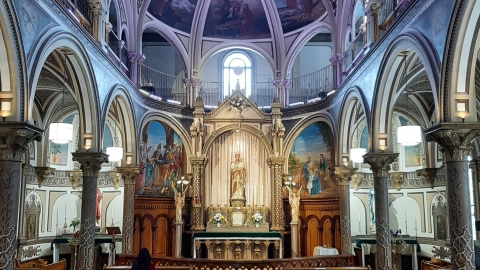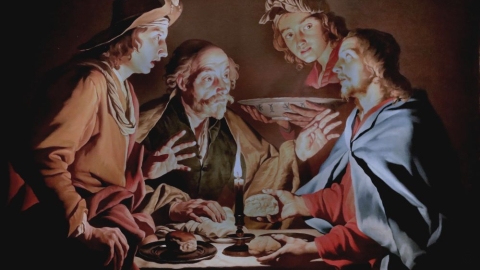Could obedience oblige us to disobey?

“You disobey the pope!” We’ve heard this reasoning many times, especially on the occasion of the episcopal consecrations. In fact, Archbishop Lefebvre proceeded with these consecrations despite receiving a formal warning (monitum) two weeks before the ceremony. Would such an act of disobedience render Archbishop Lefebvre’s action sinful? No. In a document dated 23 March 1988, the Archbishop recalled the classic teaching of moral theologians which argues that true obedience may at times require one to disobey.
Obedience presupposes authority
Obedience presupposes authority, an authority which gives orders or issues laws. Human authorities, even those divinely instituted, only possess authority in order to pursue the proper ends of that authority assigned by God and should never thwart those ends. If an authority uses his power in contradiction to the purposes for which it was instituted, he relinquishes the right to be obeyed, and we are obliged to disobey him.
We recognize, for example, the necessity of disobedience if a father were to ask his daughter to prostitute herself, or if a civil authority were to require doctors to abort children and take innocent life, but we (seemingly) accept at all costs the authority of the pope, who should be infallible in his governance and in all his words. This view, however, ignores historical reality and presents a false vision of papal infallibility.
St. Paul long ago told St. Peter that he(Gal. 1,8).
Fraternal Correction
Discussing fraternal correction, St. Thomas Aquinas alludes to the resistance St. Paul exhibited towards St. Peter. He thus explains:
To withstand anyone in public exceeds the mode of fraternal correction, and so Paul would not have withstood Peter then, unless he were in some way his equal as regards the defense of the faith. But one who is not an equal can reprove privately and respectfully. ... It must be observed, however, that if the faith were endangered, a subject ought to rebuke his prelate even publicly. Hence Paul, who was Peter's subject, rebuked him in public, on account of the imminent danger of scandal concerning faith, and, as the gloss of Augustine says on Gal. 2,11: ‘Peter gave an example to superiors, that if at any time they should happen to stray from the straight path, they should not disdain to be reproved by their subjects’.” [1 ]
The case quoted by St. Thomas is no fantasy, for it actually happened to Pope John XXII while he was alive. This pope stated, as a personal opinion, that the souls of the elect would not enjoy the beatific vision until after the last judgement. He published this opinion in 1331, and in 1332 he expressed a similar opinion concerning the sufferings of the damned. He even intended to propose this teaching in a solemn decree. But very strong opposition from the Dominicans, especially those in Paris, and also from the Franciscans convinced him to renounce this position in favour of the traditional teaching, a teaching eventually defined by his successor Benedict XII in 1336.
Now, here is what Pope Leo XIII says in his encyclical letter Libertas preastantissimum of 20 June 1888:
If any authority whatsoever should prescribe a law that is not in accord with right reason or with the interests of the public good or with the principles of the Faith, it has no binding force.” And he adds, “As soon as the right to command is lacking or an order runs contrary to reason or to the eternal law, then it is lawful to disobey men in order to obey God.”
Disobedience to keep the Faith
But our disobedience is motivated by the need to keep the Catholic faith. The orders which were given to us clearly urge us to submit without reservation to the Second Vatican Council, to the post-conciliar reforms, and to the rules of the Holy See, that is to say, to positions and actions which are undermining our faith and destroying the Church. This is something we cannot do! To collaborate in the destruction of the Church means to betray the Church and Our Lord Jesus Christ!
Moreover, all theologians worthy of that title teach that, if the pope through his actions is destroying the Church, then we cannot obey him and that he should be rebuked respectfully but publicly (see Vitoria, Obras, 186-187; Suarez, De fide, 10.6.16; Robert Bellarmine, De Rom. Pont. 2.29; Cornelius a Lapide, ad Gal. 2,11).
The principles of obedience to the authority of the pope are like those which regulate the relationship between a delegated authority and his subjects. These principles, however, do not apply to divine authority which is always infallible and unfailing and which never permits the slightest deviation.
When the pope explicitly exercises the infallibility granted him by God, meeting all the required conditions, then we must not deviate from his will. Outside of this specific exercise of papal infallibility, however, the pope is fallible, and thus the above mentioned criteria of obedience apply to his actions. It is not, therefore, unconceivable that we may be obliged to disobey the pope.
The Pope's authority is for the glory of God
Authority was entrusted to the pope for specific purposes, particularly for the glory of the Holy Trinity and of Our Lord Jesus Christ, and for the salvation of souls. Anything undertaken by the pope in opposition to these ends has no binding force and has no right to be obeyed. Moreover, in such a situation we are obliged to disobey the pope in order to remain obedient to God and faithful to the Church.
This is the case with everything that the current popes have ordained, since the Second Vatican Council, under the guise of religious liberty and ecumenism. All the reforms made under this guise are stripped of all legal force and of all claims to our obedience. The popes have used their authority in a manner contrary to the end for which it was instituted. They have a right to our disobedience.
The SSPX disobeys only to be faithful to God
Throughout its history, the Society of St. Pius X has publicly stated the necessity of such disobedience in order to remain faithful to God and to the Church. The years 1974 to 1976 remind us of the remarkable struggle between Écône and the Vatican, between the pope and Archbishop Lefebvre. The result was our condemnation: suspensio a divinis without appeal. The pope thus abused his authority by upholding laws which run contrary to the good of the Church and to the good of souls. These recent events are an historical example of the application of the principles regulating disobedience.
Fr. Patrick de La Rocque, SSPX
Source: www.laportelatine.org
- 1(STh., IIa IIae, q.33 a.4, ad 2)



